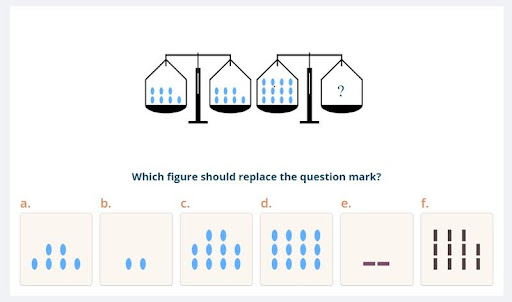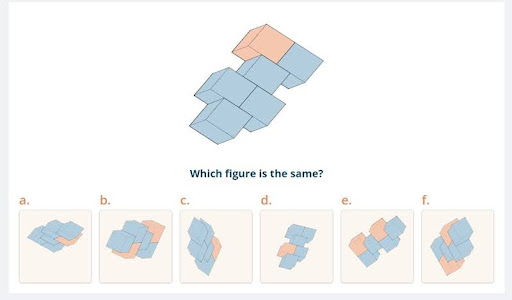The IQ test, or Intelligence Quotient test, is an aptitude test designed to measure mental skills and cognitive abilities. These tests provide valuable insights into the workings of our brains, evaluating everything from verbal and numerical reasoning to spatial and logical thinking.
By understanding what kind of questions are on an IQ test, you might be able to better prepare for the test and improve your performance. Let's explore the facets of intelligence that IQ tests measure by examining the types of questions typically found on these tests. IQ tests typically include a variety of question types to assess different aspects of intelligence.
Here are some common question types you might encounter on an IQ test:
Numerical reasoning questions are a type of aptitude test question that assesses a person's ability to work with numbers. These questions typically involve basic arithmetic, percentages, ratios, and other mathematical concepts. Numerical reasoning tests are commonly used in job recruitment processes, especially for roles that require strong numerical ability, such as finance, accounting, and data analysis.
Example: What is the next number in the sequence: 2, 4, 6, 8, __?
How to solve: This is a simple arithmetic sequence, each number increases by 2. Therefore, the next number is 10.
These questions evaluate your ability to analyze information and draw conclusions. They might include syllogisms, logic puzzles, and pattern recognition tasks.
Example:

Logical reasoning question
How to solve: The figures are the same on both sides of the scale. The weight of both figures has to be the same as well. → The correct answer is A.
These questions assess your ability to visualize and manipulate objects in space. They might include tasks like completing patterns, rotating shapes, and solving visual puzzles.
Example:

Spatial reasoning question
How to solve: Rotate the shape on the right and compare it to the options to see which one matches.
→ The correct answer is C
The questions belonging to the verbal reasoning type are also popular on the IQ tests. They assess your ability to understand and manipulate language. The verbal reasoning questions might include analogies, synonyms, antonyms, and sentence completion tasks. Verbal reasoning questions often require careful reading and analysis, which can be time-consuming. This can be challenging, especially in timed test situations where there is limited time to complete the questions.
Example: Which word is the odd one out: apple, orange, banana, snake?
How to solve: The odd one out is "snake" because it is not an animal, unlike the other three options.
Pattern recognition questions in IQ tests assess an individual's ability to identify and continue patterns or sequences. These questions often involve a series of shapes, numbers, letters, or a combination of these, where the test-taker must determine the underlying pattern and predict the next item in the sequence.
They are designed to measure a person's ability to recognize and predict patterns, which is often associated with problem-solving and analytical thinking skills.
Example:
How to solve: These questions require the test-taker to observe and analyze the given patterns, applying logic and reasoning skills to determine the correct answer.
Mathematical problem-solving questions may include a variety of math problems that test different skills, such as arithmetic, algebra, geometry, and statistics. These questions are designed to assess a person's mathematical reasoning ability, logical thinking, and problem-solving skills under pressure.
Example: If 3 people can paint 2 rooms in 3 hours, how many people are needed to paint 6 rooms in 6 hours?
How to solve: This involves setting up a proportion and solving for the unknown variable, which in this case would be the number of people needed.
Analogies questions measure a person's ability to recognize relationships and similarities between pairs of words or concepts. These questions typically present a pair of words with a certain relationship, and the test-taker must identify another pair of words that have a similar relationship.
Analogies are often used in IQ tests because they require logical reasoning and the ability to understand and apply abstract concepts. They can assess a person's ability to think analytically, make connections between different ideas, and solve problems creatively.
Example: Hand is to glove as foot is to __?
How to solve: This involves recognizing the relationship between the first pair of words (hand is worn inside a glove) and applying the same relationship to the second pair of words (foot is worn inside a shoe).
Visual puzzles in the IQ test require the use of visual-spatial skills to solve. These puzzles often involve patterns, shapes, or images that need to be analyzed and manipulated mentally to find a solution. Visual puzzles can be challenging and require the ability to visualize shapes and patterns mentally. They are often used in IQ tests to assess visual-spatial reasoning skills, which are important for tasks that involve understanding and interpreting visual information.
The classification puzzles in the IQ test are designed to measure the process of organizing items or concepts into categories based on shared characteristics. This involves identifying similarities and differences and determining how items relate to each other within a group.
Example: Which word does not belong in the group: kiwi, banana, mango, or table?
How to solve: Determine the common characteristic of the first three words (they are all fruits) and identify the word that does not share this characteristic (table).
General knowledge quizzes measure the ability to retain and recall information. Knowledge quizzes involve storing and retrieving information, and they play an important role in learning and cognitive processes.
Example: The following question tests memory:
Q: What is the capital of France?
A) Washington DC
B) Paris
C) Berlin
D) Madrid
Correct answer: B) Paris
In conclusion, the IQ test comprises various types of questions that aim to assess different cognitive abilities, including verbal, mathematical, spatial, and logical reasoning. Examples of these questions include analogies, series completion, and mathematical problems. To excel in IQ tests, it is essential to practice regularly, understand the question formats, and employ effective problem-solving strategies. By mastering these tips and techniques, individuals can improve their performance on IQ tests and achieve their full cognitive potential.